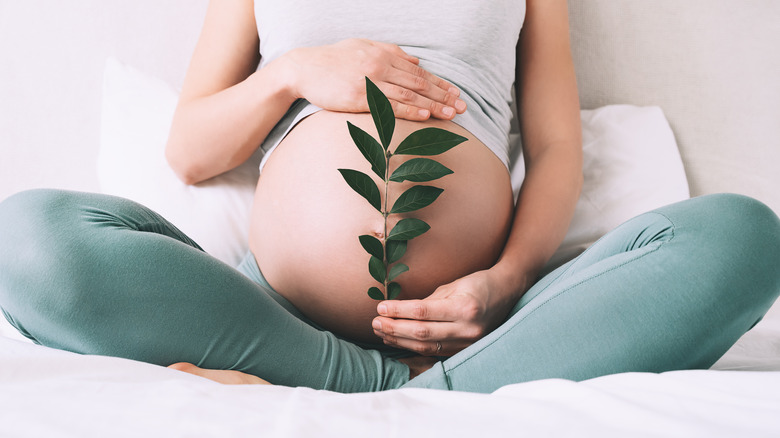How To Tell If You're Actually Having Braxton-Hicks Contractions
As exciting as it may be to know that your baby is on the way, contractions are nobody's idea of fun. Many women get a bit of a warm-up in the weeks or months leading up to labor with relatively painless Braxton-Hicks contractions (via WebMD). According to Deborah Raines of the University of Buffalo and Danielle Cooper of the LSU Health Sciences Center, many pregnant people are unfamiliar with Braxton-Hicks contractions and therefore seek unnecessary care and evaluation (via StatPearls Publishing). However, these contractions are entirely normal.
Braxton-Hicks contractions happen when the uterine muscles tighten and relax. This is the body's way of preparing for labor, and while they may eventually thin the cervix in a similar way as real contractions, they don't result in delivery (via Healthline). These contractions may occur more frequently in the afternoon or evening. They may also be triggered by dehydration, a full bladder, or physical or sexual activity (per American Pregnancy Association).
This is how to differentiate between Braxton-Hicks and real contractions
You may be wondering how to differentiate Braxton-Hicks contractions from real contractions, especially if you are close to your due date. The biggest difference between Braxton-Hicks and real contractions is that real contractions are painful (often very much so), whereas Braxton-Hicks contractions typically are not (via StatPearls Publishing). Generally, Braxton-Hicks contractions are just uncomfortable, and feel like an abdominal tightening that comes and goes. At worst, they may feel like mild menstrual cramps. Meanwhile, real contractions cause cramping in the back that moves to the front, becoming more painful with time.
In addition, real contractions occur at regular intervals, becoming more frequent as time passes. In contrast, Braxton-Hicks contractions are irregular, unpredictable, and infrequent, often becoming weaker with time. Braxton-Hicks contractions can often be alleviated by relaxing, taking a warm bath, drinking water or a warm cup of herbal tea, or changing positions (per American Pregnancy Association).
If the contractions continue and become regular and intense, then consult your healthcare provider, especially if you experience bleeding or fluid leaking from the vagina (per Healthline). Time your contractions for an hour, and if they are coming every five minutes, it is time to go to the hospital, as you are likely in labor.


